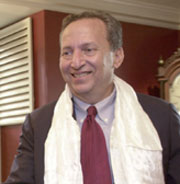|
 |
| The President Summers is wearing a kata, a
Tibetan ceremonial scarf given in greeting at Memorial
Church. |
In his five-year tenure at
Harvard University, President Lawrence H. Summers frequently found himself
in the spotlight because of rifts with faculty at the Ivy League
institution.
Shortly after he took office, a handful of prominent black studies
professors, including Cornel West, left the university after a dispute
with him. Last year, he was widely criticized for suggesting that innate
ability may partly explain why few women reach top science posts.
Tuesday, facing the second no-confidence vote by faculty members in a
year, Summers announced he would leave June 30, bringing to a close the
briefest tenure of any Harvard president since 1862, when Cornelius Felton
died after two years in office.
"I have reluctantly concluded that the rifts between me and segments of
the Arts and Sciences faculty make it infeasible for me to advance the
agenda of renewal that I see as crucial to Harvard's future," Summers
wrote in a letter posted on the school's Web site.
Harvard's arts and sciences faculty was scheduled to take its second
no-confidence vote next Tuesday, and there were signs that his support
from the school's governing board was wavering. Several newspapers have
reported that the board, known as the Corporation, had contacted faculty
members to discuss his possible departure.
Last March, the arts and sciences faculty passed a 218-185
no confidence vote in Summers
— the first known instance of such an action in the 370-year history of
the university. Faculty votes are symbolic because the seven-member
Harvard Corporation has sole authority to fire the university's president.
Judith Ryan, the professor of German and comparative literature who
introduced the latest no-confidence resolution, said Summers' resignation
was appropriate.
"I'm certainly glad we're not going to have to have that faculty
meeting on Feb. 28th, which would have been agonizing for both sides," she
said.
The latest vote was called following the resignation of Faculty of Arts
and Sciences Dean William Kirby. Some faculty believe he was pushed out by
Summers, though Kirby has said the decision was mutual.
Summers has led America's wealthiest university, with an endowment of
more than $25 billion, since 2001.
Supporters note that he increased access to a Harvard education with
augmented financial aid,
boosted science programs and diversified the school's faculty.
"Larry is a friend and I believe in the vision of renewal that he set
forth for the university," said David Gergen, a former White House adviser
who teaches at Harvard's Kennedy School of Government. "He recognized that
it was almost impossible to move things forward."
Derek Bok, Harvard's president from 1971 to 1991, will serve as
interim president from July 1
until a new president is found.
Summers, a former Harvard economics professor and U.S. Treasury
secretary in the Clinton administration, said he will return to teaching
at Harvard after a year sabbatical.
(Agencies) |